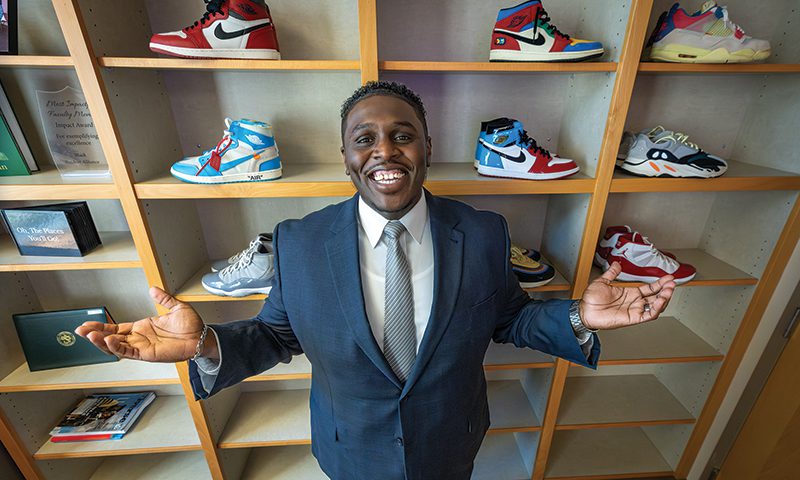
5 Questions with Kelvin Herrera-Hassan
Kelvin Herrera-Hassan has served as executive director for the Office of Inclusive Excellence since June of 2022. His office supports the success of historically underrepresented communities on campus and engages the campus community through educational programming and collaborations with student organizations and university departments.
1. What does inclusive excellence mean to you?
Inclusive excellence means just being able to recognize and celebrate the uniqueness and contributions of each individual. When you talk about inclusive excellence at the campus level, that then shifts to accountability and focusing on continuous improvement. Being inclusive is tough and it takes work. “Excellence” means it’s a nonstop effort. We’re always refining, always reshaping.
2. Your outfits are always ON POINT. What’s the secret to your style?
I appreciate that. I like to think I put a little effort into it here and there. A big part of it’s where I’m from—New York. It’s instilled in us to always put effort into what you’re wearing. I also think it allows others to see a little bit of my expression through what I have on. It allows me to connect with our students. I’m a big sneakerhead too. I have over 40 pairs of sneakers. I’m working on decreasing that number, but it doesn’t work if you continue to buy. But I think the secret is just being you.
3. Congrats on your recent engagement! How is engaged life treating you?
It is a blessing. The best thing is having a partner for life who understands me and will be on my team on the good and bad days. It’s understanding you don’t have to do this life thing alone. It feels good to have that person who’s always sharpening you, helping you to get better. It keeps me grounded.
4. How do you approach difficult conversations with people that don’t believe in the work you’re doing?
It’s tough. I think if you want to do DEI (Diversity, Equity and Inclusion) work in a way where you’re not antagonizing folks, or “weaponizing” it as some might say, you have to understand people’s perspectives. Do they have to understand yours? No. But you have to understand theirs, and that’s the most difficult part of this work. I also have to be open to feedback and compromise. The only thing I ask in return is they be similarly open.
One of the things we do with every training we have is establish “community agreements.” The last two items speak to this: You may leave with more questions than you do answers. And have fun. Often, people think this work is brutal or painful. It can be, but all the same, you can have fun doing it.
5. Why do you think it’s important to keep dialogue around diversity, equity and inclusion open?
If you take away one thing from this interview, this should be it: Keeping the dialogue around diversity, equity, and inclusion open is necessary in order to maintain functions across campus. I know a lot of people don’t think about it that way, but when you have conversations about diversity or equity or inclusion, it builds trust and strengthens community bonds. A lot of issues come from the unknown—not being familiar with a person’s customs, culture or beliefs. Being around folks who don’t look like you or believe in similar things like you, it helps combat the unknown.
A lot of the issues we face today stem from systems that were put in place way before we were even born, way before our parents were even born. A lot of biases were written into the way things are now, including institutions. Opening the dialogue around these systemic issues allows us to address them effectively. If we don’t acknowledge these issues exist, if we’re not even willing to continue the conversation, then we start ignoring our history. How can we learn to move forward without being able to learn from our past? We need open dialogue if we hope to improve upon the present.

